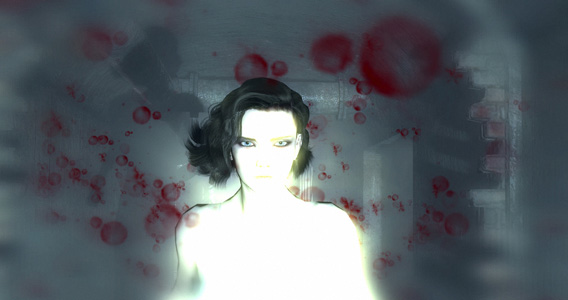
Inspired by the real life events of Violette Szabo during the Second World War, Velvet Assassin places players in the boots of Violette Summer, tasked with the disruption of the Nazi war machine far behind the front lines of the escalating conflict. And though that summary is sufficient for some, the game has also tasked me with writing one of the most important reviews of my short career, because Velvet Assassin is fighting a war on two fronts. The 1s and 0s pressed onto this disc are relentless in the attempt to bring humanity to a videogame with a style made distinct through both the action and inaction available to the player. And where the game functions within the stealth genre, it manages to upset the status quo of my expectations every bit as much as Metal Gear did so many years ago.
It’s already evident that my opinion is the minority view, others having already dismissed the title as another mediocre entry within the crowded arena of World War II games. But this viewpoint is problematic due largely to my tendency to play a game to completion, which in this case proved to me that Velvet Assassin is one of the most challenging titles gamers have ever been offered. And while I don’t expect reviewers and critics to always agree, this negative opinion of the title is troublesome when considering that a review ideally attempts to convey reactions, feelings, and emotional responses to a media product – because if this is the case, than I’m confident that a play-through of Velvet Assassin would lead us all to believe that these reviewers are as hardened and emotionally detached as the men Violette hunts. The ease with which others have already passed this title over oozes with the same spirit of inept complacency that plunged us into the current economic crisis.
If I had to preface a sense of the game for this review – and I do – I’d probably reference the sub-plot from the Tim Robbins film The Player. It involves a director who adamantly wants to create a film that resists the bland and typical habits of American cinema, offering a more solemn and thereby human depiction of life. However by the end of the film proper the director has created a typical Hollywood blockbuster and is content with the success. With this in mind, we should be grateful that Velvet Assassin has emerged like a foreign media, resistant to the marketing pressure that would normally prevent this type of gaming experience – instead delivering the repetitious experience others want you to believe this to be. At times it dips into melodrama, at its best when such moments are contrasted with the stark reality of the scenes players witness when moving Violette through the environments. And while Velvet Assassin is a sorrowful experience, that isn’t what makes the title compelling. Rather it is the reality the game offers that has left me exhausted, and euphorically disorientated, earnestly engaged by a true artistic accomplishment. And if you’re willing to read on, I think we can reach an understanding about why this is, and perhaps why I’ll assuredly be drinking alone at gaming industry events.
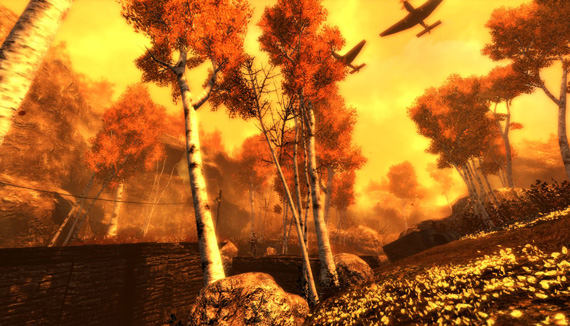
Initially, Velvet Assassin’s more distinguishing feature is that the game takes place so far from the frontlines of a war players have fought so many times before. Subsequently there aren’t any gigantic machine-gun wielding Nazis screaming as you lead the assault toward another bunker. And for the areas depicted within the game, there is also no hope that liberation is arriving anytime soon. Instead there is a desperate air of hopelessness as soldiers move with ominous steps and the population succumbs to the intimidation that separates the mood of this game from any other in recent memory.
The mission structure that follows curiously reverses the law of averages, because they should have compiled a mediocre game but manage to defeat the odds. Where as so many gaming experiences begin on a high note only to descend into mindless repetition that strays from the original focus, Velvet Assassin continually finds the means to draw the player deeper through a mixture of game-play repetition that never feels overtly drawn out. There are two specific missions that involve sabotage operations, and the objective of both will feel relatively comfortable to most. And even as the game leads into assassination missions there is no sense that the direction is breaking away from conventions. But when players begin sneaking through the Warsaw Ghetto while the Nazis clear the population, or insert themselves between a small village marked for extermination and an elite Nazi death squad, Velvet Assassin rises above any previous game about the war and becomes a legitimate and unique experience. And these later revelations contrast the early stages so convincingly, that any initial monotony becomes a fair price for full admission.
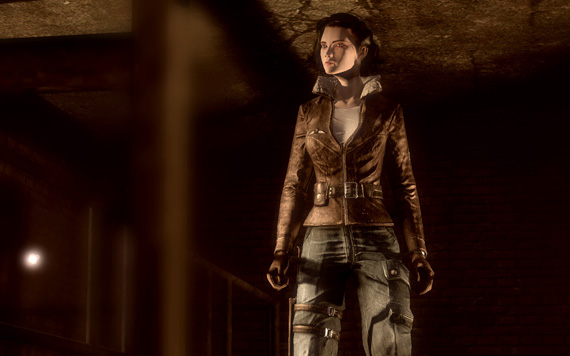
The game also achieves a distinct style in the ways that it doesn’t challenge the graphical prowess of larger titles. But rather than surrendering to the bland types of scenery we know so well, the game uses familiar structures only as a template on which a signature style is achieved. Daytime exterior sequences occur during a fading autumn, where a slight blurring effect dabs the red and yellow leaves of trees like a painting that only subtlety obscures the reality of our eyes to create a remarkable sensation of abstract expression. The result is soft and chilling as German planes fly overhead and soldiers mutter, sing, or opt to stumble with intoxicated steps to offset the boredom of their guard duties.
Concealed by the shadows cast from trees, walls, and vegetation, Violette’s silhouette glows purple to signify that enemies are ignorant to her presence. And this begins the game of patience that is central to the title, as players listen and watch German patrols while crawling through the tall grass, waiting for a careless soldier to expose his back and allow the stealth kill. The manoeuvre is triggered with a single button press, causing Violette to perform any number of animations to slice, shoot, and otherwise silently execute the target. Afterward the body must be dragged into the same shadows that concealed her before any other soldiers notice and raise the alarm. If successful, they will never question where the dead soldier has gone, merely returning to their routes. Outside, the sunlight doesn’t move dynamically (but how great would that be?) darkened paths remain fixed throughout each area, though not always with equal accommodation. The window between stealth kills narrows dramatically as the number of soldiers on patrol increases, and the crushing sound of leaves can instantly expose your position.
The tedium of familiar interior settings is primarily augmented by lighting effects, offering strong shades of contrasting colour and shadows that build an atmosphere akin to classic horror films. Most often there is the harsh white from floodlights eager to cast Violette’s shadow against the walls to alert soldiers to her presence. And as with the leaves outside, broken glass is scattered throughout the area to betray her silent steps.
None of these elements is new to the stealth genre.
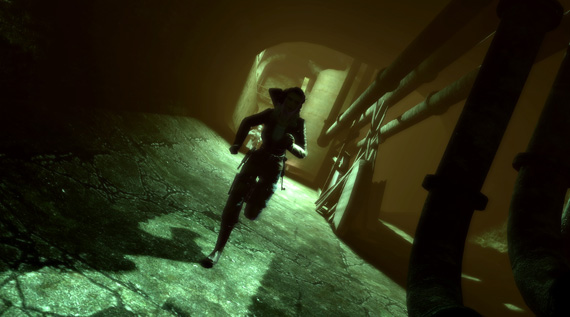
Where the game begins to feel different may start with the shadows soldiers cast against the walls, or the echo of their coughing that helps guide Violette and prevent smacking straight into them within those confined spaces. Soldiers will often obscure the light with their own bodies, allowing her to gain the advantage. The first time I was able to damage a fuse box to cut the lights altogether and swallow the enemy with the darkness that enabled a stealth kill, the game began to feel very different from what I had expected. I’d like to say there are numerous ways to kill enemies aside from the stealth kill, but that would be a tad deceptive. Except for the final sequences of the game, the run-and-gun method is done away with by the fact that Violette can’t take many hits. Because rooms don’t reset, it is possible to start a fight, be discovered, and leave the room long enough for the soldiers to return to their positions and seemingly forget the intrusion. And while there were times that tactic could help bypass a particularly hectic room, it always felt like a betrayal that defeated the point of playing the game to begin with.
What separates this game from other stealth titles is that there is no balance between stealth and action, so much so that I spent nearly all of my time crawling as opposed to running – both to conceal my footsteps and because I grew increasingly invested in the experience. And while the structure of a building might prove linear and predictable, the interior placement of enemies and objects revealed a deadly puzzle game at work, challenging me with the strategy that each new room required. My preoccupation was not in bypassing soldiers, but in finding the means to kill every one of them without being detected. While this relies heavily on stealth kills, there were also opportunities to manipulate power boxes to electrocute soldiers walking through water, or firing into puddles of gasoline to ignite them and burn my enemies just as easily. The game also offers the greatest stealth ability to date, which allows players to pull the pin from the grenade on an enemy’s belt, essentially creating a walking bomb.
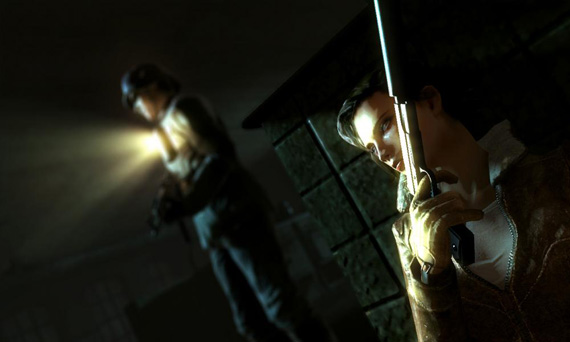
For all my strategic plotting, there were several times where the room offered more than one means to dispatch or out-manoeuvre soldiers. Beyond the variance of those additional techniques, finding a way around a soldier looking in Violette’s direction is also key. The threat of a waiting soldier behind each door is combated by the ability to peer through keyholes before entering, which allows players to wait for soldiers to turn around before bursting inward for the kill. For her part, Violette moves like a panther, naturally increasing the enjoyment of the hunt through the accentuation of her movements. Slitting the throat of an officer as he examines plundered art is indescribably satisfying. There is an attempt to bring some humanity to the soldiers. Often players will find letters written to loved ones, likely written by a soldier they have just killed. At times soldiers also make strange noises while walking their patrols, breaking into song or having arguments with other soldiers. And perhaps what is so surreal and disturbing about this is that way it brings small moments of innocent humanity to soldiers we know capable of monstrous acts, lessening the sense that these are aliens from another planet and forcing our relation to them through the shared humanity of these acts. Even more so when Violette infiltrates areas dressed as one of them and soldiers remark at her beauty.
There are also collectibles to find along the way, which are placed as historically sensible items such as lighters, signet rings, medals and the like. And in a rare case of providing incentive for the hunt, collecting these items offers experience points that allow three categories of Violette’s character to be upgraded, increasing the speed of her stealth movements, the capacity to perform her special attack, or the amount of damage she can sustain from enemies. Even with upgrades however, Violette can never sustain much damage, with most gunfights resulting in death unless you can force the enemy through a narrow passage and into your waiting crosshairs. I was often able to whistle or be spotted in order to lead an enemy into those types of spots. For a game that doesn’t focus on gunplay, these weapons handle competently, though by the end of the game the pistol hose theory will be your best friend. Truly tight situations are resolved by Violette’s special attack, which involves an injection of morphine. When this is done, enemies are briefly frozen as the entire area turns white and a half naked Violette is able to run toward soldiers and kill them quickly. And while that might sound like a fairly obvious exploitation of the female protagonist, it’s the feature we will be talking about for quite some time.
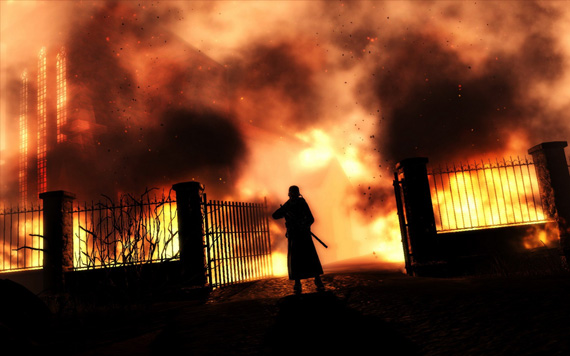
There’s no big bang moment where the game attempts to win players over. Rather, there is the most subtle increase of options and stimuli that eventually lead further away from monotony toward a rewarding experience. The narration of these missions is spliced with images of Violette, injured and unconscious in a hospital bed. There is every reason to believe that these missions are as much a series of memories based on what did occur mixed with the unreliable nature of the dreams, or in this case nightmares, Violette may be having. And whenever players use the morphine attack, the game-play is subjected to an extreme instance of unreality. This doesn’t open some mindless plot hole, but offers the chance to question everything that is taking place. Are these memories too painful for Violette to remember fully? Or did they happen quite the way they are being remembered? Are they a mixture of reality and dreams? Has Violette killed so many people that her actions have become a blur in the absence of exact details? Of course details grow unreliable with time, subject to personal interpretation, just as the game bases itself on real events while delving into fiction and each play-through of the game is further subjected based on the differences between players. When you consider how hard some people work to make excuses for other games, such as the concerted effort to idealize No More Heroes as instant art, here is the most open opportunity for subjective interpretation and discussion within a videogame to date. This is a mature videogame in the truer sense of the word, not simply because of the rating on the box.
It’s helpful that Pandemic is working to create their own game about a World War II saboteur, because expectantly that game will allow players to liberate Paris from Nazi control and offer an important contrast for Velvet Assassin. The truth is that Violette cannot liberate Paris or bring about an end to the war. She is not a one man army, but only a woman caught up in events larger than everyone involved, subsequently descending into the madness that those events bring about. Madness in fact becomes the overarching theme of the game as it progresses. And because the game rarely relies on cinematic sequences, it is experienced directly through the game-play that forces players to learn more about their prey, as when soldiers in Warsaw place bets on who can kill the most prisoners with the least amount of bullets. What begins to take shape is the idea that Violette’s mission is portrayed as important but often exposes a futility as she proves unable to save the people she can see and hear suffering. She must move through the shadows, sometimes bypassing villainous men in order to kill an honourable one when he is taken for interrogation. Violette’s mission becomes conflicted, a series of give and take scenarios that offer no clear reward. Her actions additionally causing more suffering as the Nazis seek retaliation on civilians in response.
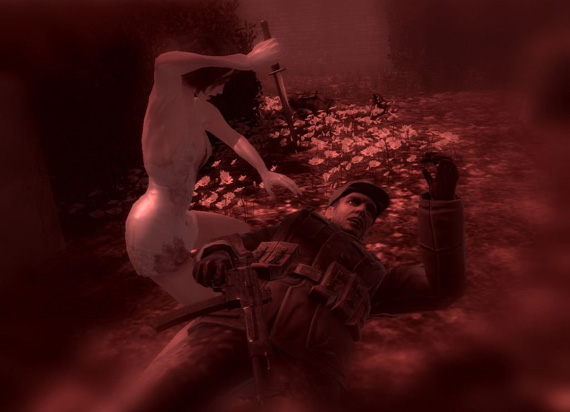
When Violette finally awakes from that hospital bed there is a sense that all of this has pushed her into the mouth of madness. Her actions begin to mimic frustration as she stalks through the hospital in her blood stained negligee, her stealth kills repeatedly causing her to stab soldiers in a new fashion, plunging the knife into their bodies furiously while gritting her teeth against their blood drenched gurgling. No other game in memory has offered such a stark portrayal of a female character. Players are suddenly presented with a woman who is both mentally and physically stripped, her femininity not making her some vulnerable sex object, but instead transforming her into a feral force of blind rage as she loses her identity to the violence erupting all around her. And that moment where she loses herself, is the first instance within a videogame where I can recall witnessing a real empowering portrayal of a woman suffering with the weight of the human condition so often hoarded by the male perspective.
As with Violette, Velvet Assassin is less likely to win the war for the attention it deserves, and more likely to create a resistance to the real monotony that plagues the gaming industry. It all begins with you taking the risk of simply picking up the controller, and disregarding the opinions of those who continually remind us of why there are no qualifications for what I’ll reluctantly call the gaming press. But when they are trading their keyboards in for paper-hats, Velvet Assassin will still be on the right side of history. And you can take my word on it and experience a game that truly leaves its mark, or bow to the opinions of people who would review and score a lamp if it meant they didn’t have to pay for it.